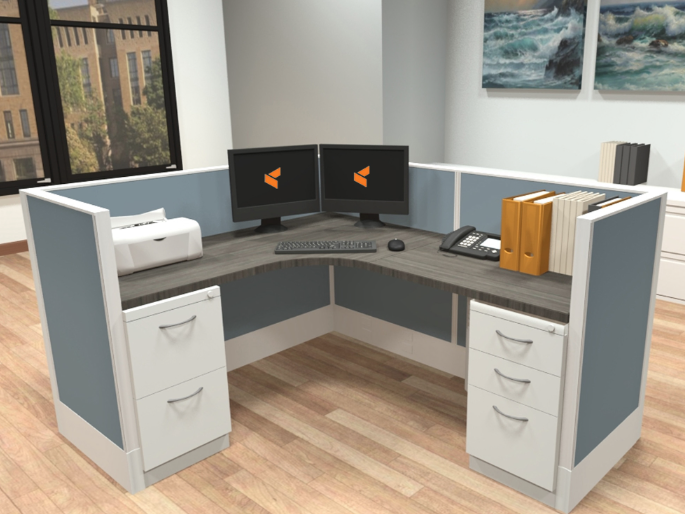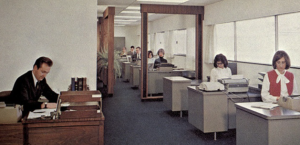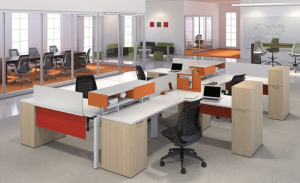Modular Office Furniture: How Flexibility Drives Modern Workspaces
The modern workplace is undergoing a dramatic transformation. According to the International Facility Management Association (IFMA), 68% of employees desire more flexibility in where and how they work. This is driving companies to invest in modular office furniture solutions that can adapt to changing workplace needs. This shift represents more than just a trend, it’s a fundamental reimagining of how Canadian businesses approach workspace design and employee satisfaction.
Traditional fixed office layouts, with their permanent cubicles and static configurations, no longer meet the demands of today’s dynamic workforce. As hybrid work models become the norm and employees seek greater autonomy over their work environment, businesses are discovering that modular office furniture offers the perfect solution. These adaptable systems provide the flexibility, cost-effectiveness, and sustainability that modern Canadian workspaces require.
The global office furniture market reflects this growing demand, with projections showing growth from $61.35 billion in 2025 to $99.58 billion by 2032. Modular systems are expected to lead this expansion, with a compound annual growth rate of 5.5% from 2025 to 2030.
For Canadian businesses, this presents an opportunity to stay ahead of the curve. All while creating workspaces that truly serve their evolving needs.

Understanding Modular Office Furniture
Modular office furniture represents a revolutionary approach to workspace design. Built on the principles of adaptability and flexibility. Unlike traditional fixed furniture systems, modular office furniture consists of interchangeable components that can be easily reconfigured, expanded, or reorganised. All of these changes are possible in order to meet changing business needs.
The key characteristics that define modular office furniture include:
- Standardised connections – Allow different pieces to work together seamlessly
- Interchangeable components – Desks, storage units, panels, and accessories that mix and match
- Scalable design – Start with basic setups and expand as your business grows
- Quick reconfiguration – Transform spaces in minutes, not hours
Popular types of modular systems include workstation configurations that can transform from individual focused work areas to collaborative team spaces within minutes.
Flexible seating solutions range from task chairs on wheels to modular lounge seating that can be rearranged for different meeting styles.
Storage components include mobile pedestals, modular shelving units, and personal lockers that move with employees as workspace needs change.
Acoustic panels and dividers represent another crucial category of modular office furniture, allowing businesses to create private spaces within open floor plans without permanent construction.
Height-adjustable workstations accommodate different users and work styles. Promoting ergonomic health whilst maintaining the flexibility to adapt to various tasks throughout the day.
The Evolution of Workplace Needs
The journey from traditional office design to today’s flexible workspaces tells the story of changing business needs and employee expectations.
The cubicle farms of the 1980s and 1990s gave way to open office concepts in the early 2000s, but even these layouts proved too rigid for the dynamic nature of modern work.
The COVID-19 pandemic accelerated discussions about workspace flexibility. With permanent shifts in working patterns now widely acknowledged, businesses realised that location and square footage alone weren’t sufficient considerations.
The need for versatile furniture for agility became apparent as organisations looked to transform their spaces and respond to changes in workplace culture.
Current workplace trends emphasise hybrid work models where employees split time between home and office environments. Activity-based working has gained prominence, with different areas designated for focused work, collaboration, learning, and socialising.
This approach requires modular office furniture that can quickly transform spaces from quiet concentration zones to dynamic team areas.
Canadian workplace statistics reflect these global trends, with remote work adoption rates remaining significantly higher than pre-pandemic levels.
According to Statistics Canada, flexible work arrangements have become a permanent feature of the Canadian labour market. Many employees are expecting their physical workspaces to mirror this flexibility.
Health and wellness priorities have also evolved, with employees ranking quality-of-life issues above salary considerations in many cases. This shift has led to the emergence of “resimercial” design. This is a blend of residential comfort with commercial functionality that makes offices feel like a “home from home.”

Key Benefits of Modular Office Furniture
Enhanced Flexibility and Adaptability
The primary advantage of modular office furniture lies in its unmatched adaptability. One could reduce their footprint by half using efficient design tactics such as sliding, stacking doors that enable intimate rooms to expand for larger functions.
This level of flexibility allows businesses to maximise their space efficiency whilst maintaining functionality.
Multi-functional spaces become achievable with modular systems. A conference room can quickly transform into a training facility using flip-top folding tables and easily stacked chairs on wheels. Storage units double as flexible partitioning for ad-hoc meeting spaces, whilst seating cubes can create temporary auditorium-style arrangements for town halls without dedicating permanent space.
The ability to reconfigure workspaces seasonally or project-by-project provides tremendous value. Teams can expand and contract their collaborative areas based on current needs, and if floor plans require changes or an organisation relocates, multipurpose furniture adapts to entirely new environments.
Cost-Effectiveness and Return on Investment
Modular office furniture delivers significant financial advantages through multiple avenues:
- Lower initial investment – Standardised components benefit from economies of scale
- Reduced relocation costs – Furniture adapts to new spaces rather than requiring replacement
- Extended lifespan – Quality pieces can be reconfigured and repurposed instead of discarded
- Maintenance savings – Replace individual components rather than entire workstations
The extended lifespan of quality modular pieces provides excellent return on investment, as components can be reconfigured and repurposed rather than discarded when business needs evolve. This approach reduces downtime and minimises disruption to daily operations.
Improved Employee Satisfaction and Productivity
Employee autonomy over their workspace contributes significantly to job satisfaction and productivity. Modular office furniture provides the choice and customisation options that modern workers value, allowing them to adapt their environment to their specific work styles and tasks.
Ergonomic benefits emerge naturally from height-adjustable and adaptable furniture systems. Employees can modify their workstations throughout the day to maintain comfort and health, reducing the risk of repetitive strain injuries and promoting overall wellbeing.
The ease of creating collaborative spaces when needed enhances team dynamics and communication. Rather than booking formal meeting rooms for every interaction, teams can quickly configure impromptu collaboration areas using modular components, fostering spontaneous innovation and problem-solving.
Sustainability and Environmental Impact
The environmental benefits of modular office furniture address growing corporate sustainability concerns. Current waste statistics paint a concerning picture: in the UK alone, an estimated 1.2 million office desks and 1.8 million office chairs end up in landfills each year, whilst U.S. Environmental Protection Agency figures put overall annual furniture waste at almost 10 million tonnes.
Modular systems combat this waste through circular economy principles. Instead of discarding furniture when needs change, businesses can reconfigure, repurpose, and extend the useful life of their investments. This approach aligns with ambitious decarbonisation targets that many Canadian businesses have adopted.
The Wise Fintech company exemplifies sustainable modular furniture implementation, not only upcycling and re-upholstering existing pieces but implementing forward-thinking materials like ROOM booths made from 1,088 recycled plastic bottles. Such innovations demonstrate how modular office furniture can contribute to broader environmental goals.

Implementation Strategies for Canadian Businesses
Successfully implementing modular office furniture requires careful planning and strategic thinking. The assessment phase should begin with a thorough evaluation of current workspace utilisation, employee work styles, and future growth projections. Understanding how different teams collaborate and what types of spaces they require most frequently informs better furniture selection decisions.
Key Implementation Considerations:
- Space layout and flow – Ensure modular components can move freely without creating bottlenecks
- Technology integration – Plan for devices, charging needs, and connectivity solutions
- Compliance requirements – Meet Canadian accessibility standards and workplace safety regulations
- Phased approach – Start with high-traffic areas before expanding throughout the office
- Change management – Provide training and support to help employees embrace flexibility
A phased implementation approach often proves most successful, allowing businesses to gradually transition whilst learning what configurations work best for their specific needs. Starting with high-traffic areas or departments most eager for change can build momentum and demonstrate value before expanding to other areas.
Vendor selection should prioritise Canadian suppliers who understand local regulations and can provide ongoing support. Look for manufacturers with strong sustainability credentials, comprehensive warranty programs, and flexible financing options that align with your budget planning requirements.
Popular Modular Office Furniture Solutions
Workstation systems form the backbone of most modular office furniture implementations. Height-adjustable desks accommodate different users throughout the day, whilst modular desk configurations can expand or contract based on project needs. These systems often include integrated cable and power management to maintain clean, professional appearances regardless of configuration.
Seating solutions have evolved far beyond traditional office chairs. Modular seating systems include task chairs that move easily between workstations, collaborative furniture that can be reconfigured for different meeting styles, and lounge seating that creates comfortable informal spaces for relaxation or casual conversations.
Storage systems provide essential functionality whilst maintaining flexibility. Mobile pedestals move with employees as they change workstations, modular shelving adapts to different storage needs, and personal lockers can be relocated without major renovation projects.
Space division solutions create privacy and noise control without permanent construction. Acoustic panels reduce sound transmission between work areas, mobile partitions can quickly create temporary private spaces, and living plant walls provide both division and biophilic benefits.
Collaboration furniture represents perhaps the most dynamic category of modular office furniture. Meeting tables that can be linked together for large gatherings or separated for small team sessions, mobile whiteboards that move where needed, and soft seating clusters that invite informal collaboration all contribute to more engaging and productive workspaces.
Future Trends and Innovations
The modular office furniture industry continues evolving to meet emerging workplace demands. Technology integration represents a major trend, with smart furniture featuring IoT capabilities that can monitor usage patterns, adjust settings automatically, and provide data for space optimisation decisions.
Sustainability focus will intensify, with increased use of recycled and bio-based materials becoming standard rather than exceptional. Manufacturers are developing new materials that maintain durability whilst minimising environmental impact throughout their lifecycle.
Biophilic design integration acknowledges the human connection to nature, with modular systems incorporating living plants, natural materials, and organic shapes that promote wellbeing whilst maintaining functionality and flexibility.
Artificial intelligence will increasingly inform space optimisation, with data-driven insights guiding furniture placement and configuration decisions. These systems will learn from usage patterns and suggest improvements to enhance both efficiency and employee satisfaction.
Health-focused features continue gaining importance, with antimicrobial surfaces, air-purifying materials, and ergonomic innovations becoming standard components of modular office furniture systems. The Canadian market shows particular interest in wellness-focused solutions that support both physical and mental health.

Ready to Transform Your Workspace?
Modular office furniture isn’t just a trend—it’s the future of flexible, cost-effective workspace design. With benefits spanning employee satisfaction, environmental sustainability, and bottom-line savings, the question isn’t whether to make the switch, but when.
Your workspace should evolve as quickly as your business does. Modular systems provide the agility to adapt without major renovations or lengthy downtime, giving you the competitive edge that truly adaptable workspaces deliver.
Ready to explore modular solutions for your business? WDI Group has helped hundreds of businesses across North America deliver workspace projects on time and on budget. From initial design concepts to construction and furniture selection, our comprehensive approach ensures seamless execution. Our track record speaks for itself—dozens of clients return to us again and again for their future buildouts, trusting our expertise to bring their vision to life.
Whether you’re planning a complete office transformation or looking to enhance your current space with modular office furniture, WDI Group’s experienced team can guide you through every step of the process. Speak with our expert team to discover how we can help create a workspace that works as hard as you do.


